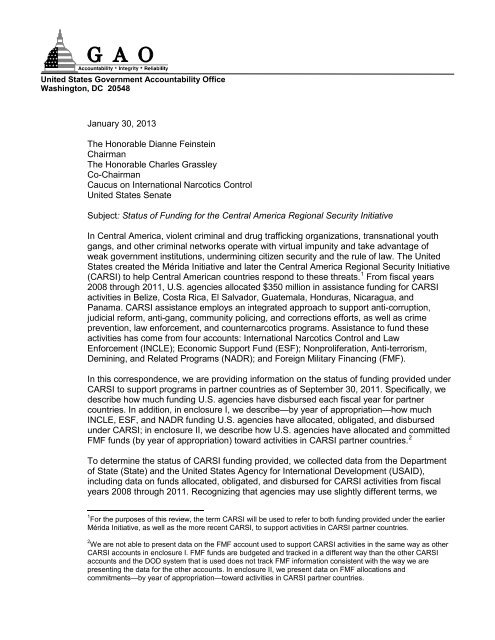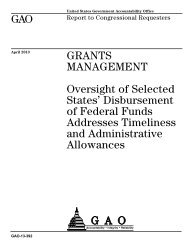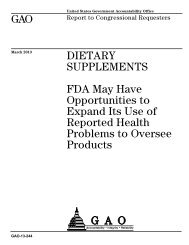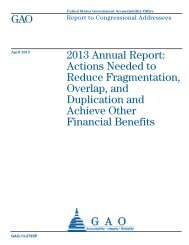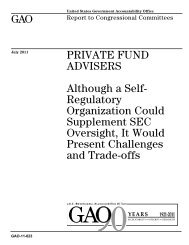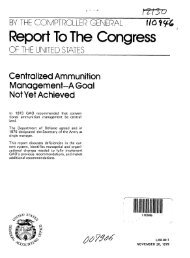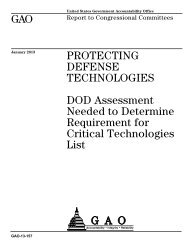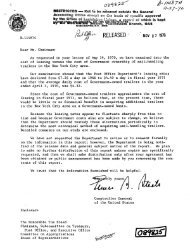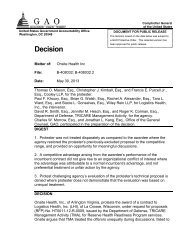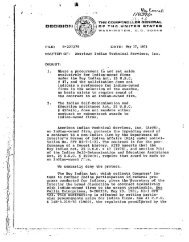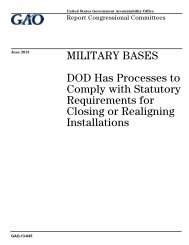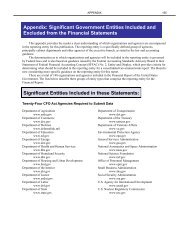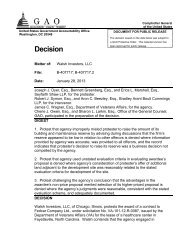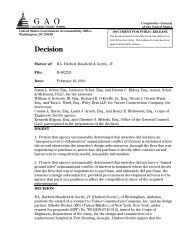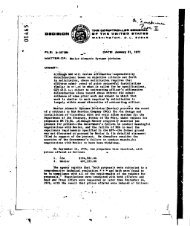Status of Funding for the Central America Regional Security Initiative
Status of Funding for the Central America Regional Security Initiative
Status of Funding for the Central America Regional Security Initiative
You also want an ePaper? Increase the reach of your titles
YUMPU automatically turns print PDFs into web optimized ePapers that Google loves.
United States Government Accountability Office<br />
Washington, DC 20548<br />
January 30, 2013<br />
The Honorable Dianne Feinstein<br />
Chairman<br />
The Honorable Charles Grassley<br />
Co-Chairman<br />
Caucus on International Narcotics Control<br />
United States Senate<br />
Subject: <strong>Status</strong> <strong>of</strong> <strong>Funding</strong> <strong>for</strong> <strong>the</strong> <strong>Central</strong> <strong>America</strong> <strong>Regional</strong> <strong>Security</strong> <strong>Initiative</strong><br />
In <strong>Central</strong> <strong>America</strong>, violent criminal and drug trafficking organizations, transnational youth<br />
gangs, and o<strong>the</strong>r criminal networks operate with virtual impunity and take advantage <strong>of</strong><br />
weak government institutions, undermining citizen security and <strong>the</strong> rule <strong>of</strong> law. The United<br />
States created <strong>the</strong> Mérida <strong>Initiative</strong> and later <strong>the</strong> <strong>Central</strong> <strong>America</strong> <strong>Regional</strong> <strong>Security</strong> <strong>Initiative</strong><br />
(CARSI) to help <strong>Central</strong> <strong>America</strong>n countries respond to <strong>the</strong>se threats. 1 From fiscal years<br />
2008 through 2011, U.S. agencies allocated $350 million in assistance funding <strong>for</strong> CARSI<br />
activities in Belize, Costa Rica, El Salvador, Guatemala, Honduras, Nicaragua, and<br />
Panama. CARSI assistance employs an integrated approach to support anti-corruption,<br />
judicial re<strong>for</strong>m, anti-gang, community policing, and corrections ef<strong>for</strong>ts, as well as crime<br />
prevention, law en<strong>for</strong>cement, and counternarcotics programs. Assistance to fund <strong>the</strong>se<br />
activities has come from four accounts: International Narcotics Control and Law<br />
En<strong>for</strong>cement (INCLE); Economic Support Fund (ESF); Nonproliferation, Anti-terrorism,<br />
Demining, and Related Programs (NADR); and Foreign Military Financing (FMF).<br />
In this correspondence, we are providing in<strong>for</strong>mation on <strong>the</strong> status <strong>of</strong> funding provided under<br />
CARSI to support programs in partner countries as <strong>of</strong> September 30, 2011. Specifically, we<br />
describe how much funding U.S. agencies have disbursed each fiscal year <strong>for</strong> partner<br />
countries. In addition, in enclosure I, we describe—by year <strong>of</strong> appropriation—how much<br />
INCLE, ESF, and NADR funding U.S. agencies have allocated, obligated, and disbursed<br />
under CARSI; in enclosure II, we describe how U.S. agencies have allocated and committed<br />
FMF funds (by year <strong>of</strong> appropriation) toward activities in CARSI partner countries. 2<br />
To determine <strong>the</strong> status <strong>of</strong> CARSI funding provided, we collected data from <strong>the</strong> Department<br />
<strong>of</strong> State (State) and <strong>the</strong> United States Agency <strong>for</strong> International Development (USAID),<br />
including data on funds allocated, obligated, and disbursed <strong>for</strong> CARSI activities from fiscal<br />
years 2008 through 2011. Recognizing that agencies may use slightly different terms, we<br />
1 For <strong>the</strong> purposes <strong>of</strong> this review, <strong>the</strong> term CARSI will be used to refer to both funding provided under <strong>the</strong> earlier<br />
Mérida <strong>Initiative</strong>, as well as <strong>the</strong> more recent CARSI, to support activities in CARSI partner countries.<br />
2 We are not able to present data on <strong>the</strong> FMF account used to support CARSI activities in <strong>the</strong> same way as o<strong>the</strong>r<br />
CARSI accounts in enclosure I. FMF funds are budgeted and tracked in a different way than <strong>the</strong> o<strong>the</strong>r CARSI<br />
accounts and <strong>the</strong> DOD system that is used does not track FMF in<strong>for</strong>mation consistent with <strong>the</strong> way we are<br />
presenting <strong>the</strong> data <strong>for</strong> <strong>the</strong> o<strong>the</strong>r accounts. In enclosure II, we present data on FMF allocations and<br />
commitments—by year <strong>of</strong> appropriation—toward activities in CARSI partner countries.
provided agencies with definitions from GAO’s A Glossary <strong>of</strong> Terms Used in <strong>the</strong> Federal<br />
Budget Process and asked agencies to provide <strong>the</strong> relevant data according to <strong>the</strong>se<br />
definitions. 3 To <strong>the</strong> extent possible, we worked with agencies to ensure that <strong>the</strong>y provided<br />
data that met <strong>the</strong>se definitions. Because FMF funds are budgeted and tracked in a different<br />
way than <strong>the</strong> o<strong>the</strong>r CARSI accounts, we collected in<strong>for</strong>mation on CARSI FMF allocations<br />
and commitments. We reviewed funding data and documents from State and USAID and<br />
interviewed relevant agency <strong>of</strong>ficials regarding <strong>the</strong>se documents and data, including <strong>the</strong><br />
reliability <strong>of</strong> data provided by <strong>the</strong>se agencies. For <strong>the</strong> purposes <strong>of</strong> this review, we<br />
determined that <strong>the</strong> data provided were sufficiently reliable. We conducted work on this<br />
correspondence as part <strong>of</strong> a broader review <strong>of</strong> CARSI. We will complete that review, which<br />
will include updated in<strong>for</strong>mation on <strong>the</strong> status <strong>of</strong> CARSI funding, later in 2013. See<br />
enclosure III <strong>for</strong> a complete description <strong>of</strong> our scope and methodology.<br />
We conducted our work from August 2012 through January 2013 in accordance with all<br />
sections <strong>of</strong> GAO’s Quality Assurance Framework that are relevant to our objective. The<br />
framework requires that we plan and per<strong>for</strong>m <strong>the</strong> engagement to obtain sufficient and<br />
appropriate evidence to meet our stated objectives and to discuss any limitations in our<br />
work. We believe that <strong>the</strong> in<strong>for</strong>mation and data obtained, and <strong>the</strong> analysis conducted,<br />
provide a reasonable basis <strong>for</strong> any findings and conclusions in this product.<br />
Background<br />
In 2007, President George W. Bush and Mexican President Felipe Calderón announced <strong>the</strong><br />
Mérida <strong>Initiative</strong>, a multiyear assistance package to Mexico and <strong>Central</strong> <strong>America</strong>, to help<br />
address increasing violence and criminal activity, especially from drug trafficking<br />
organizations and o<strong>the</strong>r criminal organizations. Under <strong>the</strong> Mérida <strong>Initiative</strong>, <strong>the</strong> United States<br />
funded programs in <strong>Central</strong> <strong>America</strong> <strong>for</strong> capacity building and o<strong>the</strong>r support to improve law<br />
en<strong>for</strong>cement institutions, promote economic and social development, and conduct<br />
interdiction training. According to a report by <strong>the</strong> United States Senate Caucus on<br />
International Narcotics Control 4 and o<strong>the</strong>r reporting, <strong>the</strong> security situation in <strong>Central</strong> <strong>America</strong><br />
has deteriorated in recent years as Mexican drug trafficking organizations, transnational<br />
gangs, and o<strong>the</strong>r criminal groups have expanded <strong>the</strong>ir activities, contributing to escalating<br />
levels <strong>of</strong> crime and violence. Violence is particularly high in El Salvador, Guatemala, and<br />
Honduras, with homicide rates among <strong>the</strong> highest in <strong>the</strong> world.<br />
Recognizing <strong>the</strong>se evolving threats, in 2010 <strong>the</strong> Obama administration separated <strong>the</strong><br />
<strong>Central</strong> <strong>America</strong> portion <strong>of</strong> <strong>the</strong> Mérida <strong>Initiative</strong> and renamed it CARSI. CARSI is designed<br />
as a collaborative partnership between <strong>the</strong> United States and <strong>the</strong> region, focused on<br />
meeting <strong>the</strong> needs <strong>of</strong> <strong>the</strong> region. The five primary goals <strong>of</strong> CARSI are to:<br />
• create safe streets <strong>for</strong> citizens in <strong>the</strong> region;<br />
• disrupt <strong>the</strong> movement <strong>of</strong> criminals and contraband to, within and between <strong>the</strong> nations<br />
<strong>of</strong> <strong>Central</strong> <strong>America</strong>;<br />
• support <strong>the</strong> development <strong>of</strong> strong, capable, and accountable <strong>Central</strong> <strong>America</strong>n<br />
governments;<br />
• re-establish effective state presence and security in communities at risk; and<br />
• foster enhanced levels <strong>of</strong> security coordination and cooperation between <strong>the</strong> nations<br />
<strong>of</strong> <strong>the</strong> region.<br />
3 GAO, A Glossary <strong>of</strong> Terms Used in <strong>the</strong> Federal Budget Process, GAO-05-734SP (Washington, D.C.: Sept.<br />
2005).<br />
4 United States Senate Caucus On International Narcotics Controls, Responding to Violence in <strong>Central</strong> <strong>America</strong><br />
(Washington, D.C: Sept. 2011).<br />
Page 2<br />
GAO-13-295R CARSI <strong>Funding</strong>
<strong>Funding</strong> <strong>for</strong> CARSI has come from four <strong>for</strong>eign assistance accounts:<br />
• INCLE: The INCLE account provides assistance to <strong>for</strong>eign countries and<br />
international organizations to assist <strong>the</strong>m in developing and implementing policies<br />
and programs that maintain <strong>the</strong> rule <strong>of</strong> law and streng<strong>the</strong>n institutional law<br />
en<strong>for</strong>cement and judicial capabilities, including countering drug flows and combating<br />
transnational crime.<br />
• ESF: The ESF account assists <strong>for</strong>eign countries in meeting <strong>the</strong>ir political, economic,<br />
and security needs by funding a range <strong>of</strong> activities, including those designed to<br />
counter terrorism and extremist ideology, increase <strong>the</strong> role <strong>of</strong> <strong>the</strong> private sector in <strong>the</strong><br />
economy, develop effective legal systems, build transparent and accountable<br />
governance, and empower citizens.<br />
• NADR: The NADR account funds contributions to certain organizations supporting<br />
nonproliferation, and provides assistance to <strong>for</strong>eign countries <strong>for</strong> nonproliferation,<br />
demining, antiterrorism, export control assistance, and o<strong>the</strong>r related activities.<br />
• FMF: The FMF account provides grants and loans to <strong>for</strong>eign governments and<br />
international organizations <strong>for</strong> <strong>the</strong> acquisition <strong>of</strong> U.S. defense equipment, services,<br />
and training.<br />
Summary<br />
As <strong>of</strong> September 30, 2011, <strong>of</strong> <strong>the</strong> $350 million that U.S. agencies had allocated to support<br />
CARSI activities, State and USAID had disbursed over $75 million <strong>of</strong> INCLE, ESF, and<br />
NADR funds. 5 In addition, State had committed almost $22 million <strong>of</strong> FMF funds to support<br />
CARSI activities. The two principal accounts <strong>for</strong> CARSI are <strong>the</strong> INCLE and ESF accounts.<br />
U.S. agencies also allocated funds <strong>for</strong> <strong>Central</strong> <strong>America</strong> from <strong>the</strong> NADR and FMF accounts.<br />
From fiscal years 2008 through 2011, State and USAID disbursed about $44.4 million in<br />
INCLE funds, $25.9 million in ESF funds, and almost $5 million in NADR funds to support<br />
CARSI activities in partner countries. The agencies used <strong>the</strong> funds to support programs in<br />
<strong>Central</strong> <strong>America</strong>n countries that streng<strong>the</strong>n law en<strong>for</strong>cement and maritime interdiction<br />
capabilities, support capacity building and training programs, and deter and detect border<br />
criminal activity. To demonstrate how funding <strong>for</strong> CARSI activities has been allocated,<br />
obligated, and disbursed—by year <strong>of</strong> appropriation—we are providing this in<strong>for</strong>mation in<br />
enclosure I. In addition, we present data on how funding <strong>for</strong> CARSI activities under FMF has<br />
been allocated and committed—by year <strong>of</strong> appropriation—in enclosure II.<br />
Agencies Disbursed over $75 Million in Funds to Support CARSI Activities from Fiscal<br />
Years 2008 through 2011<br />
As <strong>of</strong> September 30, 2011, State and USAID had disbursed over $75 million <strong>for</strong> CARSI<br />
activities and committed almost $22 million <strong>of</strong> FMF funds. <strong>Funding</strong> <strong>for</strong> CARSI has primarily<br />
come from two accounts—INCLE and ESF. <strong>Funding</strong> also came from <strong>the</strong> NADR and FMF<br />
accounts. State manages <strong>the</strong> INCLE, NADR, and FMF accounts, while State shares<br />
responsibility with USAID to manage and administer <strong>the</strong> ESF account. Within State, <strong>the</strong><br />
Bureau <strong>for</strong> International Narcotics and Law En<strong>for</strong>cement Affairs (INL) administers INCLE.<br />
The Bureau <strong>for</strong> Political-Military Affairs administers <strong>the</strong> FMF account, while <strong>the</strong> Department<br />
<strong>of</strong> Defense (DOD) oversees <strong>the</strong> actual procurement and transfer <strong>of</strong> goods and services<br />
purchased with <strong>the</strong>se funds. State’s Bureau <strong>of</strong> International <strong>Security</strong> and Nonproliferation<br />
and its Bureau <strong>of</strong> Counterterrorism administer NADR. State's Bureau <strong>of</strong> Western<br />
Hemisphere Affairs administers a portion <strong>of</strong> ESF and its Bureau <strong>of</strong> Educational and Cultural<br />
5 USAID disburses only ESF funds while State disburses INCLE, ESF, and NADR funds to support CARSI<br />
activities.<br />
Page 3<br />
GAO-13-295R CARSI <strong>Funding</strong>
Affairs also previously administered some ESF funds. However, USAID oversees <strong>the</strong><br />
implementation <strong>of</strong> most programs funded from ESF.<br />
INCLE <strong>Funding</strong> <strong>for</strong> CARSI Activities<br />
As <strong>of</strong> September 30, 2011, State disbursed approximately $44.4 million <strong>of</strong> CARSI INCLE<br />
funds from fiscal years 2008 through 2011 to support CARSI partner countries. State used<br />
<strong>the</strong>se funds to support streng<strong>the</strong>ning <strong>the</strong> ability <strong>of</strong> <strong>Central</strong> <strong>America</strong>n law en<strong>for</strong>cement<br />
institutions to fight crime, violence, and trafficking in drugs and firearms. For example, it<br />
used funds to support law en<strong>for</strong>cement units, such as vetted units; to support an expansion<br />
<strong>of</strong> a prison management initiative; and to provide technical assistance to enhance<br />
prosecutorial capacity and encourage cooperation among prosecutors, judges, and police. 6<br />
State used almost 30 percent <strong>of</strong> disbursed funds <strong>for</strong> regional activities, such as equipment<br />
and training <strong>for</strong> law en<strong>for</strong>cement activities (see table 1). State disbursed <strong>the</strong> largest amount<br />
<strong>of</strong> INCLE funds <strong>for</strong> CARSI activities in fiscal year 2011, with <strong>the</strong> largest portions going, in<br />
decreasing order, to Guatemala, Panama, and El Salvador.<br />
Table 1: INCLE <strong>Funding</strong> Disbursed to Support CARSI Activities, Fiscal Years 2008<br />
through 2011<br />
Dollars in thousands<br />
Country FY2008 FY2009 FY2010 FY2011 Total<br />
Belize 0 13 746 675 1,434<br />
Costa Rica 0 1 768 1,872 2,641<br />
El Salvador 0 353 1,482 4,048 5,883<br />
Guatemala 0 1,001 1,630 6,501 9,132<br />
Honduras 0 0 100 3,596 3,696<br />
Nicaragua 0 23 157 770 950<br />
Panama 0 267 2,813 4,686 7,766<br />
<strong>Regional</strong> 0 35 9,318 3,518 12,871<br />
CARSI INCLE Total 0 1,693 17,014 25,666 44,373<br />
Source: GAO analysis <strong>of</strong> State data.<br />
Notes: Data as <strong>of</strong> September 30, 2011. Amounts rounded to <strong>the</strong> nearest thousand. Figures in table may not sum<br />
correctly due to rounding. In State’s financial tracking <strong>for</strong> <strong>the</strong> INCLE account, disbursed amounts are labeled as<br />
dispensed amounts.<br />
USAID ESF <strong>Funding</strong> <strong>for</strong> CARSI Activities<br />
As <strong>of</strong> September 30, 2011, USAID and State disbursed approximately $25.9 million <strong>of</strong><br />
CARSI ESF funds from fiscal years 2008 through 2011 to support CARSI partner countries.<br />
According to agency <strong>of</strong>ficials, USAID utilized ESF funding <strong>for</strong> CARSI to support various<br />
types <strong>of</strong> capacity building and training programs, such as work to help at-risk youth, set up<br />
youth outreach centers, and encourage justice re<strong>for</strong>m. For fiscal year 2010, almost half <strong>of</strong><br />
<strong>the</strong> funds USAID disbursed went to support programs and activities in El Salvador (see table<br />
2). For fiscal year 2011, USAID disbursed <strong>the</strong> largest amount <strong>of</strong> funds to support<br />
Guatemala, while programming <strong>for</strong> <strong>the</strong> <strong>Regional</strong> Sustainable Development Program and El<br />
Salvador received <strong>the</strong> second and third largest amounts.<br />
6 Vetted units are groups <strong>of</strong> partner-nation law en<strong>for</strong>cement <strong>of</strong>ficials who undergo background checks, including<br />
polygraph examinations. These vetted units conduct complex investigations in areas such as firearms and<br />
narcotics trafficking, gangs, bulk cash smuggling, and money laundering.<br />
Page 4<br />
GAO-13-295R CARSI <strong>Funding</strong>
Table 2: USAID ESF <strong>Funding</strong> Disbursed to Support CARSI Activities, Fiscal Years<br />
2008 through 2011<br />
Dollars in thousands<br />
Country a FY2008 FY2009 FY2010 FY2011 Total<br />
El Salvador 0 0 2,031 3,082 5,113<br />
Guatemala 0 0 311 3,973 4,284<br />
Honduras 0 0 850 2,001 2,851<br />
Nicaragua 0 0 372 342 714<br />
Panama 0 54 221 1,746 2,021<br />
<strong>Central</strong> <strong>America</strong> <strong>Regional</strong><br />
0 0 0 0 0<br />
Program b<br />
<strong>Regional</strong> Sustainable<br />
0 0 487 3,184 3,671<br />
Development Program c<br />
CARSI ESF (USAID) Total 0 54 4,272 14,328 18,654<br />
Source: GAO analysis <strong>of</strong> USAID data.<br />
Notes: Data as <strong>of</strong> September 30, 2011. Amounts rounded to nearest thousand. Figures in table may not sum<br />
correctly due to rounding.<br />
a USAID has no assistance programs in Belize or Costa Rica, thus nei<strong>the</strong>r country directly received ESF funding<br />
from USAID.<br />
b The <strong>Central</strong> <strong>America</strong> <strong>Regional</strong> Program is administered out <strong>of</strong> El Salvador. According to USAID <strong>of</strong>ficials, its<br />
location is advantageous <strong>for</strong> programs that support <strong>the</strong> <strong>Central</strong> <strong>America</strong>n Integration System (SICA), which is<br />
headquartered in El Salvador. SICA is <strong>the</strong> institutional framework <strong>for</strong> regional integration in <strong>Central</strong> <strong>America</strong>; it<br />
was created by Belize, Costa Rica, El Salvador, Guatemala, Honduras, Nicaragua, and Panama.<br />
c The <strong>Regional</strong> Sustainable Development Program is managed out <strong>of</strong> Washington, D.C., and is targeted to<br />
programs in El Salvador, Honduras, Guatemala, Nicaragua, and Panama.<br />
State ESF <strong>Funding</strong> <strong>for</strong> CARSI Activities<br />
According to agency <strong>of</strong>ficials, State utilized ESF funding to support high-impact, sustainable<br />
engagements that focus on at-risk youth (such as job training and after school programs)<br />
and communities that are experiencing high levels <strong>of</strong> crime and violence. In addition, as<br />
directed in <strong>the</strong> Supplemental Appropriations Act <strong>for</strong> fiscal year 2008, State made $5 million<br />
<strong>of</strong> State CARSI ESF funding available <strong>for</strong> an Economic and Social Development Fund <strong>for</strong><br />
<strong>Central</strong> <strong>America</strong> to help support educational exchange programs. 7 According to State<br />
<strong>of</strong>ficials, State ESF funding <strong>for</strong> CARSI is, as appropriate, aligned with complementary<br />
USAID ESF and INCLE activities to ensure that State is leveraging its resources. Between<br />
fiscal year 2008 and fiscal year 2011, State disbursed <strong>the</strong> largest amount <strong>of</strong> CARSI ESF<br />
funding in fiscal year 2009 to help support educational exchange programs with funds being<br />
used to support activities in all seven CARSI countries (see table 3). In fiscal year 2010,<br />
State disbursed CARSI ESF funding to support activities only in Belize; in fiscal year 2011,<br />
over half <strong>of</strong> <strong>the</strong> funds State disbursed went to support activities in Costa Rica.<br />
7 See Supplemental Appropriations Act, 2008, Pub. L. No. 110-252, § 1407, June 30, 2008.<br />
Page 5<br />
GAO-13-295R CARSI <strong>Funding</strong>
Table 3: State ESF <strong>Funding</strong> Disbursed to Support CARSI Activities, Fiscal Years 2008<br />
through 2011<br />
Dollars in thousands<br />
Country FY2008 FY2009 FY2010 FY2011 Total<br />
Belize 0 468 11 308 787<br />
Costa Rica 0 808 0 1,304 2,112<br />
El Salvador 0 694 0 0 694<br />
Guatemala 0 1,100 0 399 1,499<br />
Honduras 0 412 0 0 412<br />
Nicaragua 0 869 0 133 1,002<br />
Panama 0 651 0 83 734<br />
CARSI ESF (State) Total 0 5,002 11 2,227 7,240<br />
Source: GAO analysis <strong>of</strong> State data.<br />
Notes: Data as <strong>of</strong> September 30, 2011. Amounts rounded to <strong>the</strong> nearest thousand. Figures in table may not sum<br />
correctly due to rounding.<br />
NADR <strong>Funding</strong> <strong>for</strong> CARSI Activities<br />
As <strong>of</strong> September 30, 2011, State disbursed almost $5 million <strong>of</strong> CARSI NADR Export<br />
Control and Related Border <strong>Security</strong> (EXBS) and Counterterrorism (CT) funds from 2008<br />
through 2011 to support CARSI partner countries. NADR-EXBS seeks to prevent <strong>the</strong><br />
proliferation <strong>of</strong> weapons <strong>of</strong> mass destruction and advanced conventional weapons by<br />
helping to build effective national export control systems in countries that possess, produce,<br />
or supply strategic items, as well as in countries through which such items are most likely to<br />
transit. NADR-CT seeks to prevent terrorism and plays a key role in implementing a<br />
comprehensive approach to preventing and countering terrorist attacks on U.S. citizens and<br />
interests, at home and abroad, and helping to mitigate <strong>the</strong> impact <strong>of</strong> any attacks that may<br />
occur. From fiscal years 2008 through 2011, over 80 percent <strong>of</strong> CARSI NADR funds<br />
disbursed were from NADR-EXBS (see table 4). According to State <strong>of</strong>ficials, it is not<br />
possible to provide a country-by-country breakout <strong>of</strong> CARSI NADR-EXBS funds disbursed<br />
because <strong>the</strong> programs are intended <strong>for</strong> regional programming. State used NADR funds in<br />
CARSI partner countries to deter and detect drug smuggling, bulk currency smuggling, and<br />
o<strong>the</strong>r trans-border criminal activity.<br />
Page 6<br />
GAO-13-295R CARSI <strong>Funding</strong>
Table 4: NADR <strong>Funding</strong> Disbursed to Support CARSI Activities, Fiscal Years 2008<br />
through 2011<br />
Dollars in thousands<br />
FY2008 FY2009 FY2010 FY2011 Total<br />
NADR-EXBS a 0 974 2,283 713 3,970<br />
NADR-CT<br />
0 376 103 386 866<br />
(<strong>Regional</strong> Total)<br />
Belize 0 4 0 179 183<br />
Costa Rica 0 3 23 35 61<br />
El Salvador 0 14 5 34 53<br />
Guatemala 0 142 2 32 177<br />
Honduras 0 133 0 14 147<br />
Nicaragua 0 4 1 4 9<br />
Panama 0 0 5 32 36<br />
Costs <strong>of</strong> Grants to<br />
0 77 67 55 199<br />
Organization <strong>of</strong><br />
<strong>America</strong>n States<br />
CARSI NADR Total 0 1,350 2,386 1,099 4,835<br />
Source: GAO analysis <strong>of</strong> State data.<br />
Notes: Data as <strong>of</strong> September 30, 2011. Amounts rounded to <strong>the</strong> nearest thousand. Figures in table may not sum<br />
correctly due to rounding. NADR includes both NADR-CT and NADR-EXBS funding. CARSI NADR funds came<br />
from <strong>the</strong> fiscal year 2008 Supplemental Appropriations Act and were used to fund activities <strong>for</strong> Mérida-<strong>Central</strong><br />
<strong>America</strong>.<br />
a NADR-EXBS programming is allocated regionally and not by country.<br />
FMF <strong>Funding</strong> <strong>for</strong> CARSI Activities<br />
As <strong>of</strong> September 30, 2011, State had committed almost $22 million <strong>of</strong> FMF funds from fiscal<br />
years 2008 through 2011 to support CARSI countries. 8 These funds were used to support<br />
<strong>the</strong> streng<strong>the</strong>ning <strong>of</strong> <strong>the</strong> maritime interdiction capabilities <strong>of</strong> <strong>Central</strong> <strong>America</strong>n countries,<br />
such as protecting <strong>the</strong>ir national territory and maritime borders against transnational<br />
threats. According to State <strong>of</strong>ficials, CARSI FMF has funded equipment (such as boats in<br />
Costa Rica, Belize, and El Salvador 9 and communications equipment), maintenance and<br />
sustainment <strong>of</strong> maritime assets, and training.<br />
State was unable to provide data on annual fiscal year disbursements <strong>for</strong> CARSI FMF funds<br />
because FMF funds are budgeted and tracked in a different way than <strong>the</strong> o<strong>the</strong>r CARSI<br />
accounts and <strong>the</strong> system that is used does not track in<strong>for</strong>mation consistent with <strong>the</strong> way we<br />
are presenting financial data. The Defense <strong>Security</strong> Cooperation Agency (DSCA) and <strong>the</strong><br />
Defense Financing and Accounting Services (DFAS) are responsible <strong>for</strong> <strong>the</strong> financial<br />
systems that account <strong>for</strong> FMF funds, as well as tracking <strong>the</strong> implementation and expenditure<br />
<strong>of</strong> those funds. According to DSCA <strong>of</strong>ficials, DSCA’s system can only track FMF<br />
commitments, not annual disbursements. DFAS uses <strong>the</strong> Defense Integrated Finance<br />
System to track disbursements; however, <strong>the</strong>re is no direct link between <strong>the</strong> DSCA and<br />
DFAS systems, and <strong>the</strong> DFAS system does not track funding <strong>for</strong> specific initiatives, such as<br />
CARSI. See enclosure II <strong>for</strong> fur<strong>the</strong>r details on how FMF funds were allocated and<br />
committed—by year <strong>of</strong> appropriation—toward activities in CARSI partner countries.<br />
8 FMF commitments are funds “committed” <strong>for</strong> a specific purpose.<br />
9 According to State <strong>of</strong>ficials, CARSI FMF funds were used to procure eight boats—two <strong>for</strong> Costa Rica, two <strong>for</strong><br />
Belize, and four <strong>for</strong> El Salvador.<br />
Page 7<br />
GAO-13-295R CARSI <strong>Funding</strong>
Agency Comments<br />
We provided State and USAID with a draft <strong>of</strong> this report <strong>for</strong> <strong>the</strong>ir review. Both agencies<br />
provided technical comments on this report, which we incorporated, as appropriate.<br />
We are sending copies <strong>of</strong> this report to <strong>the</strong> appropriate congressional committees, <strong>the</strong><br />
Secretary <strong>of</strong> State, and <strong>the</strong> Administrator <strong>of</strong> USAID. In addition, <strong>the</strong> report will be available<br />
at no charge on <strong>the</strong> GAO website at http://www.gao.gov.<br />
If you or your staff members have any questions about this report, please contact me at<br />
(202) 512-7331 or johnsoncm@gao.gov. Contact points <strong>for</strong> our Offices <strong>of</strong> Congressional<br />
Relations and Public Affairs may be found on <strong>the</strong> last page <strong>of</strong> this report. GAO staff who<br />
made contributions to this report are listed in enclosure IV.<br />
Sincerely yours,<br />
Charles Michael Johnson, Jr.<br />
Director, International Affairs & Trade<br />
Enclosures (4)<br />
Page 8<br />
GAO-13-295R CARSI <strong>Funding</strong>
Enclosure I: <strong>Status</strong> <strong>of</strong> <strong>Central</strong> <strong>America</strong> <strong>Regional</strong> <strong>Security</strong> <strong>Initiative</strong> Funds<br />
To demonstrate how funding <strong>for</strong> <strong>Central</strong> <strong>America</strong> <strong>Regional</strong> <strong>Security</strong> <strong>Initiative</strong> (CARSI)<br />
activities have been allocated, obligated, and disbursed, we are providing <strong>the</strong> status <strong>of</strong><br />
CARSI funds as <strong>of</strong> September 30, 2011. The following tables show CARSI funds by<br />
account, describing how U.S. agencies have allocated, obligated, and disbursed funds (by<br />
year <strong>of</strong> appropriation) toward activities in CARSI partner countries. In addition, <strong>the</strong> tables<br />
show unobligated balances, which is <strong>the</strong> portion <strong>of</strong> an obligational authority that has not yet<br />
been obligated, and unliquidated obligations (or obligated balance), which is <strong>the</strong> amount <strong>of</strong><br />
obligation already incurred <strong>for</strong> which payment has not yet been made. 10<br />
<strong>Status</strong> <strong>of</strong> CARSI International Narcotics Control and Law En<strong>for</strong>cement Account Funds<br />
The Department <strong>of</strong> State’s (State) Bureau <strong>for</strong> International Narcotics and Law En<strong>for</strong>cement<br />
Affairs administers <strong>the</strong> CARSI International Narcotics Control and Law En<strong>for</strong>cement (INCLE)<br />
funds. Between fiscal year 2008 and fiscal year 2011, State allocated <strong>the</strong> largest amounts <strong>of</strong><br />
its CARSI INCLE funds to regional programs, Guatemala, and El Salvador (see table 1).<br />
Table 1: CARSI INCLE <strong>Funding</strong> Allocated and Disbursed toward Activities in CARSI<br />
Partner Countries (by Year <strong>of</strong> Appropriation)<br />
Dollars in thousands<br />
Country FY2008 FY2009 FY2010 FY2011 Total<br />
Belize<br />
Allocated 1,152 2,569 a 3,388 a 2,416 9,525<br />
Unobligated balance 0 0 2 b 0 c 2<br />
Unliquidated obligations d 94 2,411 3,289 2,295 8,089<br />
Disbursed e 1,058 158 97 121 1,434<br />
Costa Rica<br />
Allocated 2,118 5,120 3,295 2,500 a 13,033<br />
Unobligated balance 0 0 0 c 0 0<br />
Unliquidated obligations d 752 4,210 3,076 2,366 d 10,404<br />
Disbursed e 1,366 909 219 134 2,628<br />
Costa Rica Bilateral<br />
Allocation 0 0 500 0 500<br />
Unobligated balance 0 0 0 0 0<br />
Unliquidated obligations d 0 0 479 0 479<br />
Disbursed e 0 0 21 0 21<br />
El Salvador<br />
Allocated 4,452 12,781 a 5,359 a 6,159 28,751<br />
Unobligated balance 0 1 b 1 b 0 2<br />
Unliquidated obligations d 1,935 10,210 4,634 6,042 22,821<br />
Disbursed e 2,517 2,570 723 117 5,927<br />
Guatemala<br />
Allocated 5,464 12,109 19,272 a 16,675 53,520<br />
Unobligated balance 0 2 b 0 0 2<br />
Unliquidated obligations d 2,222 9,432 17,042 15,934 44,630<br />
Disbursed e 3,242 2,676 2,230 741 8,889<br />
Guatemala Bilateral<br />
Allocated 0 0 1,500 0 1,500<br />
Unobligated balance 0 0 0 0 0<br />
Unliquidated obligations d 0 0 1,031 0 1,031<br />
Disbursed e 0 0 469 0 469<br />
Honduras<br />
Allocated 4,469 5,571 6,585 6,537 23,162<br />
Unobligated balance 0 0 0 0 0<br />
10 GAO, A Glossary <strong>of</strong> Terms Used in <strong>the</strong> Federal Budget Process, GAO-05-734SP (Washington, D.C.: Sept.<br />
2005).<br />
Page 9<br />
GAO-13-295R CARSI <strong>Funding</strong>
Unliquidated obligations d 2,701 4,133 6,215 6,416 19,465<br />
Disbursed e 1,768 1,438 370 120 3,696<br />
Nicaragua<br />
Allocated 1,431 3,045 1,192 927 6,595<br />
Unobligated balance 0 400 b 8 b 0 408<br />
Unliquidated obligations d 1,228 2,174 900 804 5,106<br />
Disbursed e 203 471 284 123 1,081<br />
Panama<br />
Allocated 2,097 10,782 5,186 5,546 a 23,611<br />
Unobligated balance 0 0 0 0 0<br />
Unliquidated obligations d 315 6,510 4,057 4,877 d 15,759<br />
Disbursed e 1,783 4,272 1,129 669 7,853<br />
<strong>Regional</strong><br />
Allocated 3,752 18,023 8,135 30,747 60,657<br />
Unobligated balance 0 0 0 29,209 29,209<br />
Unliquidated obligations d 2,468 7,039 8,074 1,494 19,075<br />
Disbursed e 1,284 10,984 61 44 12,373<br />
Source: GAO analysis <strong>of</strong> State data.<br />
Notes: Data as <strong>of</strong> September 30, 2011. Amounts rounded to <strong>the</strong> nearest thousand. Figures in table may not sum<br />
correctly due to rounding. In INL financial tracking, disbursed amounts are labeled as dispensed amounts and<br />
allocated amounts are labeled as values allocated.<br />
a For <strong>the</strong> purpose <strong>of</strong> this report, “allocated” amounts include funds <strong>for</strong> vetted units in <strong>the</strong>se countries. The funding<br />
<strong>for</strong> <strong>the</strong> vetted units is tracked in <strong>the</strong> year in which <strong>the</strong> funds were allocated as <strong>of</strong> September 30, 2011. Vetted<br />
units were not tracked separately until fiscal year 2012.<br />
b According to State <strong>of</strong>ficials, reported unobligated amounts have expired and are no longer available <strong>for</strong><br />
obligation.<br />
c Because we are presenting budget data in thousands <strong>of</strong> dollars, amounts under $1,000 are reported as zero.<br />
For Belize <strong>the</strong> amount is $156 and <strong>for</strong> Costa Rica <strong>the</strong> amount is $288.<br />
d According to State <strong>of</strong>ficials, unliquidated obligations <strong>for</strong> INCLE are funds that have been obligated and are<br />
waiting <strong>for</strong> payment to be recorded on an obligation in <strong>the</strong> accounting system.<br />
e According to State <strong>of</strong>ficials, disbursements or liquidations <strong>for</strong> INCLE are payments applied to an obligation in <strong>the</strong><br />
accounting system.<br />
<strong>Status</strong> <strong>of</strong> CARSI Economic Support Fund Account Funds<br />
State shares responsibility with <strong>the</strong> United States Agency <strong>for</strong> International Development<br />
(USAID) to administer <strong>the</strong> Economic Support Fund (ESF). State’s Bureau <strong>for</strong> Western<br />
Hemisphere Affairs administers State's portion <strong>of</strong> ESF, while USAID oversees <strong>the</strong><br />
implementation <strong>of</strong> most programs funded from this account, according to USAID <strong>of</strong>ficials.<br />
<strong>Status</strong> <strong>of</strong> USAID's CARSI ESF Account Funds<br />
Between fiscal year 2008 and fiscal year 2011, USAID allocated <strong>the</strong> largest amounts <strong>of</strong> its<br />
CARSI ESF to Guatemala, El Salvador, and Honduras (see table 2). For fiscal year 2011,<br />
USAID <strong>of</strong>ficials said that some <strong>of</strong> <strong>the</strong>se funds were not allowed to be obligated until fiscal<br />
year 2012. For example, USAID was not able to obligate any fiscal year 2011 appropriated<br />
funds until fiscal year 2012 <strong>for</strong> activities in Guatemala, Honduras, and Nicaragua.<br />
Page 10<br />
GAO-13-295R CARSI <strong>Funding</strong>
Table 2: ESF <strong>Funding</strong> Allocated and Disbursed by USAID toward Activities in CARSI<br />
Partner Countries (by Year <strong>of</strong> Appropriation)<br />
Dollars in thousands<br />
Country a FY2008 FY2009 FY2010 FY2011 Total<br />
El Salvador<br />
Allocated 4,000 2,750 5,744 7,850 20,344<br />
Unobligated balance 0 0 0 0 0<br />
Unliquidated obligations b 0 1,649 5,731 7,850 15,230<br />
Disbursed c 4,000 1,101 13 0 5,114<br />
Guatemala<br />
Allocated 6,750 2,750 5,750 5,500 20,750<br />
Unobligated balance 0 0 0 5,500 d 5,500<br />
Unliquidated obligations b 2,466 2,750 5,750 0 10,966<br />
Disbursed c 4,284 0 0 0 4,284<br />
Honduras<br />
Allocated 2,000 4,250 5,500 7,425 19,175<br />
Unobligated balance 0 0 0 7,425 e 7,425<br />
Unliquidated obligations b 0 3,530 5,368 0 8,898<br />
Disbursed c 2,000 851 f 0 f 0 2,851<br />
Nicaragua<br />
Allocated 1,000 1,000 1,000 1,000 4,000<br />
Unobligated balance 0 0 0 1,000 d 1,000<br />
Unliquidated obligations b 577 709 1,000 0 2,286<br />
Disbursed c 423 291 0 0 714<br />
Panama<br />
Allocated 3,650 1,000 2,350 0 7,000<br />
Unobligated balance 10 g 0 0 0 10<br />
Unliquidated obligations b 1,664 977 2,328 0 4,969<br />
Disbursed c 1,976 23 22 0 2,021<br />
<strong>Central</strong> <strong>America</strong> <strong>Regional</strong> Program h<br />
Allocated 0 0 0 5,224 5,224<br />
Unobligated balance 0 0 0 2,575 d 2,575<br />
Unliquidated obligations b 0 0 0 2,649 2,649<br />
Disbursed c 0 0 0 0 0<br />
<strong>Regional</strong> Sustainable Development<br />
Program i Allocated 2,600 4,250 1,300 501 8,651<br />
Unobligated balance 0 1 g 0 251 d 252<br />
Unliquidated obligations b 1,359 2,243 877 250 4,729<br />
Disbursed c 1,241 1,874 f 555 f 0 3,670<br />
Source: GAO analysis <strong>of</strong> USAID data.<br />
Notes: Data as <strong>of</strong> September 30, 2011. Amounts rounded to <strong>the</strong> nearest thousand. Figures in table may not sum<br />
correctly due to rounding.<br />
a USAID has no assistance programs in Belize or Costa Rica, thus nei<strong>the</strong>r country directly received CARSI ESF<br />
funding from USAID.<br />
b According to State <strong>of</strong>ficials, unliquidated obligations <strong>for</strong> ESF are amounts that have been obligated but not<br />
disbursed or expensed and remain as uninvoiced or unpaid.<br />
c According to State <strong>of</strong>ficials, disbursements <strong>for</strong> ESF are payments made by <strong>the</strong> agency to o<strong>the</strong>r parties using<br />
cash, checks, or electronic transfers.<br />
d Although <strong>the</strong>se funds were appropriated in fiscal year 2011, <strong>the</strong>y were not obligated until fiscal year 2012.<br />
According to USAID <strong>of</strong>ficials, because <strong>the</strong> funds <strong>for</strong> this appropriation were not received until late in fiscal year<br />
2011 and congressional notification is required prior to obligation, USAID was delayed in obligating <strong>the</strong>se funds.<br />
In this case, according to agency <strong>of</strong>ficials, a hold was placed on <strong>the</strong> congressional notification until September<br />
22, 2011, which resulted in very limited time to obligate <strong>the</strong> funds prior to <strong>the</strong> end <strong>of</strong> fiscal year 2011.<br />
e Although appropriated in fiscal year 2011, $1,925,000 <strong>of</strong> <strong>the</strong>se funds was not obligated until fiscal year 2012.<br />
According to USAID <strong>of</strong>ficials, because <strong>the</strong> funds <strong>for</strong> this appropriation were not received until late in fiscal year<br />
2011 and congressional notification is required prior to obligation, <strong>the</strong>re was a delay in obligating <strong>the</strong>se funds. In<br />
Page 11<br />
GAO-13-295R CARSI <strong>Funding</strong>
this case, according to agency <strong>of</strong>ficials, a hold was placed on <strong>the</strong> CARSI congressional notification until<br />
September 22, 2011 which resulted in very limited time to obligate <strong>the</strong> funds prior to <strong>the</strong> end <strong>of</strong> fiscal year 2011.<br />
f According to USAID <strong>of</strong>ficials, a discrepancy <strong>of</strong> about $132,000 between Honduras and <strong>the</strong> <strong>Regional</strong> Sustainable<br />
Development Program appears because <strong>the</strong>re was a trade between <strong>the</strong> two operating units to ensure that all<br />
funds were obligated. At <strong>the</strong> end <strong>of</strong> fiscal year 2010, funds appropriated in 2009 <strong>for</strong> <strong>the</strong> <strong>Regional</strong> Sustainable<br />
Development Program were expiring and USAID’s Bureau <strong>for</strong> Latin <strong>America</strong> and <strong>the</strong> Caribbean was not able to<br />
obligate <strong>the</strong>m. These funds were transferred to USAID Honduras, which obligated <strong>the</strong>m be<strong>for</strong>e <strong>the</strong>y were going<br />
to expire. In exchange, an equal amount <strong>of</strong> 2010 funding to USAID Honduras was transferred back to <strong>the</strong><br />
<strong>Regional</strong> Sustainable Development Program <strong>for</strong> obligation.<br />
g According to USAID <strong>of</strong>ficials, <strong>the</strong>se funds are no longer available <strong>for</strong> obligation.<br />
h The <strong>Central</strong> <strong>America</strong> <strong>Regional</strong> Program is administered out <strong>of</strong> El Salvador; its location is advantageous <strong>for</strong><br />
programming that supports <strong>the</strong> <strong>Central</strong> <strong>America</strong>n Integration System (SICA), which is headquartered in El<br />
Salvador.<br />
i The <strong>Regional</strong> Sustainable Development Program is administered out <strong>of</strong> Washington, D.C., and is targeted to<br />
assist <strong>the</strong> countries <strong>of</strong> El Salvador, Honduras, Guatemala, Nicaragua, and Panama.<br />
<strong>Status</strong> <strong>of</strong> State's CARSI ESF Account Funds<br />
Between fiscal year 2008 and fiscal year 2011, State allocated <strong>the</strong> largest amounts <strong>of</strong> its<br />
CARSI ESF funding to Costa Rica, Belize, and Guatemala (see table 3). 11<br />
Table 3: ESF <strong>Funding</strong> Allocated and Disbursed by State toward Activities in CARSI<br />
Partner Countries (by Year <strong>of</strong> Appropriation)<br />
Dollars in thousands<br />
Country FY2008 a FY2009 FY2010 FY2011 b Total<br />
Belize<br />
Allocated 468 450 300 600 1,818<br />
Unobligated balance 0 0 0 600 600<br />
Unliquidated obligations c 0 130 300 0 430<br />
Disbursed d 468 320 0 0 788<br />
Costa Rica<br />
Allocated 808 800 879 1,000 3,487<br />
Unobligated balance 0 0 0 1,000 1,000<br />
Unliquidated obligations c 0 115 260 0 375<br />
Disbursed d 808 685 619 0 2,112<br />
El Salvador<br />
Allocated 694 0 0 94 788<br />
Unobligated balance 0 0 0 94 94<br />
Unliquidated obligations c 0 0 0 0 0<br />
Disbursed d 694 0 0 0 694<br />
Guatemala<br />
Allocated 1,100 400 0 69 1,569<br />
Unobligated balance 0 0 0 69 69<br />
Unliquidated obligations c 0 1 0 0 1<br />
Disbursed d 1,100 399 0 0 1,499<br />
Honduras<br />
Allocated 412 150 0 341 903<br />
Unobligated balance 0 150 e 0 341 491<br />
Unliquidated obligations c 0 0 0 0 0<br />
Disbursed d 412 0 0 0 412<br />
Nicaragua<br />
Allocated 869 200 0 208 1,277<br />
Unobligated balance 0 0 0 208 208<br />
Unliquidated obligations c 0 67 0 0 67<br />
Disbursed d 869 133 0 0 1,002<br />
11 Costa Rica and Belize do not have USAID bilateral missions; <strong>the</strong>re<strong>for</strong>e, State’s Bureau <strong>of</strong> Western Hemisphere<br />
Affairs allotted funds to <strong>the</strong>se embassies <strong>for</strong> obligation at post.<br />
Page 12<br />
GAO-13-295R CARSI <strong>Funding</strong>
Panama<br />
Allocated 651 0 177 189 1,017<br />
Unobligated balance 0 0 0 189 189<br />
Unliquidated obligations c 0 0 94 0 94<br />
Disbursed d 651 0 83 0 734<br />
Source: GAO analysis <strong>of</strong> State data.<br />
Notes: Data as <strong>of</strong> September 30, 2011. Amounts rounded to nearest thousand. Figures in table may not sum<br />
correctly due to rounding.<br />
a For fiscal year 2008, $5 million <strong>of</strong> State CARSI ESF funding was made available <strong>for</strong> an Economic and Social<br />
Development Fund <strong>for</strong> <strong>Central</strong> <strong>America</strong> to help support educational exchange programs.<br />
b According to State <strong>of</strong>ficials, because <strong>the</strong> funds <strong>for</strong> this appropriation were not received until late in fiscal year<br />
2011 and congressional notification is required prior to obligation, State was delayed in obligating <strong>the</strong>se funds.<br />
c According to State <strong>of</strong>ficials, unliquidated obligations <strong>for</strong> ESF are amounts that have been obligated but not<br />
disbursed or expensed and remain as uninvoiced or unpaid.<br />
d According to State <strong>of</strong>ficials, disbursements <strong>for</strong> ESF are payments made by <strong>the</strong> agency to o<strong>the</strong>r parties using<br />
cash, checks, or electronic transfers.<br />
e According to USAID <strong>of</strong>ficials, <strong>the</strong>se funds were initially obligated and de-obligated at State and have since been<br />
returned to USAID.<br />
<strong>Status</strong> <strong>of</strong> CARSI Nonproliferation, Anti-terrorism, Demining, and Related Programs Account<br />
Funds<br />
State’s Bureau <strong>of</strong> International <strong>Security</strong> and Nonproliferation and its Bureau <strong>of</strong><br />
Counterterrorism administer CARSI Nonproliferation, Anti-terrorism, Demining, and Related<br />
Programs (NADR) funds. NADR funds were allocated <strong>for</strong> <strong>Central</strong> <strong>America</strong>n countries under<br />
<strong>the</strong> Mérida <strong>Initiative</strong> only <strong>for</strong> fiscal year 2008. NADR Export Control and Related Border<br />
<strong>Security</strong> (EXBS) and Counterterrorism (CT) funds were used to support activities in CARSI<br />
partner countries; <strong>the</strong> largest amount <strong>of</strong> funds was allocated <strong>for</strong> NADR-EXBS activities (see<br />
table 4).<br />
Table 4: CARSI NADR <strong>Funding</strong> Allocated and Disbursed toward Activities in CARSI<br />
Partner Countries (by Year <strong>of</strong> Appropriation)<br />
Dollars in thousands<br />
<strong>Regional</strong> a FY 2008 Total<br />
NADR-CT NADR-EXBS<br />
Allocated 1,100 5,100 6,200<br />
Unobligated balance 0 10 b 10<br />
Unliquidated obligations c 234 1,121 1,355<br />
Disbursed 866 3,969 4,835<br />
Source: GAO analysis <strong>of</strong> State data.<br />
Notes: Data as <strong>of</strong> September 30, 2011. Amounts rounded to nearest thousand. Figures in table may not sum<br />
correctly due to rounding.<br />
a NADR includes both NADR-CT and NADR-EXBS funding. NADR-EXBS programming is allocated, obligated,<br />
and tracked regionally <strong>for</strong> CARSI; <strong>the</strong>re<strong>for</strong>e, State <strong>of</strong>ficials in<strong>for</strong>med us that a break-out by country is not<br />
possible. CARSI NADR funds came from <strong>the</strong> fiscal year 2008 Supplemental Appropriations Act and were used to<br />
fund activities <strong>for</strong> Mérida-<strong>Central</strong> <strong>America</strong>.<br />
b According to State <strong>of</strong>ficials, <strong>the</strong>se funds were never obligated and <strong>the</strong> obligation period <strong>for</strong> <strong>the</strong>se funds expired<br />
on September 30, 2009; <strong>the</strong>re<strong>for</strong>e, <strong>the</strong>se funds were no longer available <strong>for</strong> obligation and reverted back to <strong>the</strong><br />
Department <strong>of</strong> <strong>the</strong> Treasury. State <strong>of</strong>ficials explained that <strong>the</strong>se funds were never obligated because contracts<br />
<strong>for</strong> NADR-EXBS activities were awarded on a competitive basis and actual costs were lower than estimated.<br />
These funds could not be applied to a different program prior to <strong>the</strong> obligation period expiring.<br />
Page 13<br />
GAO-13-295R CARSI <strong>Funding</strong>
c According to State <strong>of</strong>ficials, <strong>for</strong> NADR-CT, unliquidated obligations are amounts that have been obligated, but<br />
not disbursed or expensed and remain as uninvoiced or unpaid, and <strong>for</strong> which <strong>the</strong> service may not yet have been<br />
rendered. According to State <strong>of</strong>ficials, while <strong>the</strong>se data represent <strong>the</strong> balance <strong>of</strong> unliquidated funds as <strong>of</strong><br />
September 30, 2011, <strong>the</strong> majority <strong>of</strong> <strong>the</strong>se funds has since been disbursed.<br />
Page 14<br />
GAO-13-295R CARSI <strong>Funding</strong>
Enclosure II: <strong>Status</strong> <strong>of</strong> <strong>Central</strong> <strong>America</strong> <strong>Regional</strong> <strong>Security</strong> <strong>Initiative</strong> Foreign Military<br />
Financing Account Funds<br />
This enclosure provides <strong>the</strong> status <strong>of</strong> <strong>Central</strong> <strong>America</strong> <strong>Regional</strong> <strong>Security</strong> <strong>Initiative</strong> (CARSI)<br />
Foreign Military Financing (FMF) funds as <strong>of</strong> September 30, 2011. Table 1 describes how<br />
U.S. agencies have allocated and committed FMF funds (by year <strong>of</strong> appropriation) toward<br />
activities in CARSI partner countries. The presentation <strong>of</strong> FMF allocations and commitments<br />
is different from presentations on allocations, obligations, and disbursements on <strong>the</strong> o<strong>the</strong>r<br />
CARSI accounts in enclosure I because FMF funds are budgeted and tracked in a different<br />
way.<br />
The Defense <strong>Security</strong> Cooperation Agency (DSCA) and <strong>the</strong> Defense Financing and<br />
Accounting Service (DFAS) are responsible <strong>for</strong> <strong>the</strong> financial systems that account <strong>for</strong> FMF<br />
funds, as well as tracking <strong>the</strong> implementation and expenditure <strong>of</strong> those funds. According to<br />
DSCA <strong>of</strong>ficials, FMF funds are obligated upon apportionment. Fur<strong>the</strong>r, DSCA’s system can<br />
only track FMF uncommitted and committed amounts, not unliquidated obligations or<br />
disbursements. DFAS tracks disbursements using <strong>the</strong> Defense Integrated Finance System;<br />
however, <strong>the</strong>re is no direct link between <strong>the</strong> DSCA and DFAS systems and <strong>the</strong> DFAS<br />
system does not track funding <strong>for</strong> specific initiatives, such as CARSI.<br />
The Department <strong>of</strong> State (State) allocated FMF funds <strong>for</strong> <strong>Central</strong> <strong>America</strong>n countries <strong>for</strong><br />
activities under <strong>the</strong> Mérida <strong>Initiative</strong> from fiscal year 2008 to 2010. Between fiscal year 2008<br />
and fiscal year 2010, State allocated <strong>the</strong> largest amounts <strong>of</strong> <strong>the</strong>se FMF funds to El Salvador,<br />
Costa Rica, and Panama.<br />
Table 1: CARSI FMF <strong>Funding</strong> Allocated and Committed toward Activities in CARSI<br />
Partner Countries (by Year <strong>of</strong> Appropriation)<br />
Dollars in thousands<br />
Country FY2008 FY2009 FY2010 Total<br />
Belize<br />
Allocated 0 2,978 200 3,178<br />
Unobligated balance 0 0 0 0<br />
Uncommitted a 0 0 0 0<br />
Committed b 0 2,978 200 3,178<br />
Costa Rica<br />
Allocated 2,800 1,764 325 4,889<br />
Unobligated balance 0 0 0 0<br />
Uncommitted a 0 311 0 311<br />
Committed b 2,800 1,453 325 4,578<br />
El Salvador<br />
Allocated 600 7,272 1,000 8,872<br />
Unobligated balance 0 0 0 0<br />
Uncommitted a 0 933 427 1,360<br />
Committed b 600 6,339 574 7,513<br />
Guatemala<br />
Allocated 0 0 1,375 1,375<br />
Unobligated balance 0 0 0 0<br />
Uncommitted a 0 0 0 0<br />
Committed b 0 0 1,375 1,375<br />
Honduras<br />
Allocated 0 0 1,514 1,514<br />
Unobligated balance 0 0 0 0<br />
Uncommitted a 0 0 1,514 1,514<br />
Committed b 0 0 0 0<br />
Nicaragua<br />
Allocated 0 746 786 1,532<br />
Unobligated balance 0 0 0 0<br />
Uncommitted a 0 146 786 932<br />
Page 15<br />
GAO-13-295R CARSI <strong>Funding</strong>
Committed b 0 600 0 600<br />
Panama<br />
Allocated 600 2,159 1,800 4,559<br />
Unobligated balance 0 0 0 0<br />
Uncommitted a 0 141 109 250<br />
Committed b 600 2,019 1,691 4,310<br />
Source: GAO analysis <strong>of</strong> State data.<br />
Notes: Data as <strong>of</strong> September 30, 2011. Amounts rounded to nearest thousand. Figures in table may not sum<br />
correctly due to rounding.<br />
a For <strong>the</strong> purposes <strong>of</strong> this report, “uncommitted” amounts represent FMF obligations not yet committed <strong>for</strong><br />
expenditure.<br />
b For <strong>the</strong> purpose <strong>of</strong> this report, “committed” amounts include FMF funding that has been committed, but not yet<br />
disbursed, and FMF funding that has been disbursed to a case.<br />
Page 16<br />
GAO-13-295R CARSI <strong>Funding</strong>
Enclosure III: Scope and Methodology<br />
To describe <strong>the</strong> status <strong>of</strong> <strong>Central</strong> <strong>America</strong> <strong>Regional</strong> <strong>Security</strong> <strong>Initiative</strong> (CARSI) funding, we<br />
obtained data from <strong>the</strong> Department <strong>of</strong> State (State) and <strong>the</strong> United States Agency <strong>for</strong><br />
International Development (USAID) concerning funds allocated to support programs in<br />
<strong>Central</strong> <strong>America</strong>n countries under <strong>the</strong> Mérida <strong>Initiative</strong> in 2008 and 2009 and under CARSI<br />
in 2010 and 2011 through four accounts—International Narcotics Control and Law<br />
En<strong>for</strong>cement (INCLE); Economic Support Fund (ESF); Nonproliferation, Anti-terrorism,<br />
Demining, and Related Programs (NADR); and Foreign Military Financing (FMF). We<br />
obtained <strong>the</strong> data from each bureau at State that administers those accounts (International<br />
Narcotics and Law En<strong>for</strong>cement, Western Hemisphere Affairs, International <strong>Security</strong> and<br />
Nonproliferation, Counterterrorism, and Political-Military Affairs). We also obtained data from<br />
USAID, which also allocates and implements <strong>the</strong> ESF account. In particular, State and<br />
USAID provided data on <strong>the</strong> status <strong>of</strong> allocations, unobligated balances, unliquidated<br />
obligations, and disbursements <strong>for</strong> <strong>the</strong> ESF account; State also provided this data <strong>for</strong> <strong>the</strong><br />
INCLE and NADR accounts. State’s bureaus and USAID administer <strong>the</strong> accounts separately<br />
and utilize <strong>the</strong>ir own data collection systems and budgeting terms. To address differences<br />
between <strong>the</strong>ir systems, we provided State and USAID with <strong>the</strong> definitions from GAO’s A<br />
Glossary <strong>of</strong> Terms Used in <strong>the</strong> Federal Budget Process (GAO-05-734SP) and requested<br />
that State and USAID provide <strong>the</strong> relevant data according to those definitions. To <strong>the</strong> extent<br />
possible, we worked with agencies to ensure that <strong>the</strong>y provided data that met <strong>the</strong>se<br />
definitions. However, FMF funds are budgeted and tracked in a different way than <strong>the</strong> o<strong>the</strong>r<br />
<strong>for</strong>eign assistance accounts that support CARSI. The Defense <strong>Security</strong> Cooperation Agency<br />
(DSCA) and <strong>the</strong> Defense Financing and Accounting Service (DFAS) are responsible <strong>for</strong> <strong>the</strong><br />
financial systems that account <strong>for</strong> FMF funds, as well as tracking <strong>the</strong> implementation and<br />
expenditure <strong>of</strong> those funds. DSCA’s system can only track FMF uncommitted and committed<br />
amounts, not unliquidated obligations or disbursements. DFAS tracks disbursements using<br />
<strong>the</strong> Defense Integrated Finance System; however, <strong>the</strong>re is no direct link between <strong>the</strong> DSCA<br />
and DFAS systems and <strong>the</strong> DFAS system does not track funding <strong>for</strong> specific initiatives, such<br />
as CARSI. There<strong>for</strong>e, State was not able to provide data on unliquidated obligations or<br />
disbursements, but <strong>the</strong>y were able to provide us with data on CARSI FMF allocations and<br />
commitments. We also interviewed <strong>of</strong>ficials from each <strong>of</strong> State’s bureaus and USAID on<br />
<strong>the</strong>ir budgeting process and terms to determine <strong>the</strong> best method <strong>for</strong> collecting comparable<br />
data across accounts. We <strong>the</strong>n reviewed <strong>the</strong> data and consulted with State and USAID on<br />
<strong>the</strong> accuracy and completeness <strong>of</strong> <strong>the</strong> in<strong>for</strong>mation. When we found discrepancies, we<br />
contacted relevant agency <strong>of</strong>ficials and worked with <strong>the</strong>m to resolve <strong>the</strong> discrepancies. We<br />
noted any differences in <strong>the</strong> ways <strong>the</strong> agencies collected, categorized or reported <strong>the</strong>ir data<br />
in notes to <strong>the</strong> tables in this report. To assess <strong>the</strong> reliability <strong>of</strong> <strong>the</strong> data provided, we<br />
requested and reviewed in<strong>for</strong>mation from agency <strong>of</strong>ficials regarding <strong>the</strong> underlying financial<br />
data systems and <strong>the</strong> checks, controls, and reviews used to generate <strong>the</strong> data and ensure<br />
its accuracy and reliability. For <strong>the</strong> purposes <strong>of</strong> this review, we determined that <strong>the</strong> data<br />
provided were sufficiently reliable.<br />
We conducted our work from August 2012 through January 2013 in accordance with all<br />
sections <strong>of</strong> GAO’s Quality Assurance Framework that are relevant to our objective. The<br />
framework requires that we plan and per<strong>for</strong>m <strong>the</strong> engagement to obtain sufficient and<br />
appropriate evidence to meet our stated objectives and to discuss any limitations in our<br />
work. We believe that <strong>the</strong> in<strong>for</strong>mation and data obtained, and <strong>the</strong> analysis conducted,<br />
provide a reasonable basis <strong>for</strong> any findings and conclusions in this product.<br />
Page 17<br />
GAO-13-295R CARSI <strong>Funding</strong>
Enclosure IV: GAO Contact and Staff Acknowledgments<br />
GAO Contact<br />
Charles Michael Johnson, Jr., (202) 512-7331, or johnsoncm@gao.gov<br />
Staff Acknowledgments<br />
In addition to <strong>the</strong> contact named above, Valérie Nowak, Assistant Director; Ian A. Ferguson;<br />
Marisela Perez; Ryan Vaughan; and Bruce Kutnick made major contributions to this report.<br />
Martin de Alteriis, Mary E. Moutsos, Ernie Jackson, Juan Gobel, and Karen Deans also<br />
provided assistance.<br />
(320952)<br />
Page 18<br />
GAO-13-295R CARSI <strong>Funding</strong>


